The pandemic has given residents of port towns another reason to head for home when flocks of cruise ship passengers disembark en masse.
Even before the advent of Covid-19, there were gripes about swarms of passengers swamping shops, footpaths, cafes and bus services, but now fear of catching the virus has been added to the mix, and Covid experts says there is some justification for that.
Covid-19 modellers say having thousands of people living in close quarters heightens the risk of virus transmission.
Visiting cruise ships must report the number of cases on board when they arrive in port, and again when they leave.
According to Te Whatu Ora Health New Zealand, by mid-December 628 cases had been reported on arrivals and 1781 on departures for vessels carrying just over 68,000 passengers and crew.
Since the cruise season kicked off in August, the Majestic Princess has twice taken the crown for the highest number of infections.
On November 8 when the ship docked in Auckland, 180 people were isolating out of 4388 on board, and by the following day in Tauranga, it had risen to 317.
A few days later on arrival in Sydney numbers had soared to 800, affecting almost one in five people aboard.
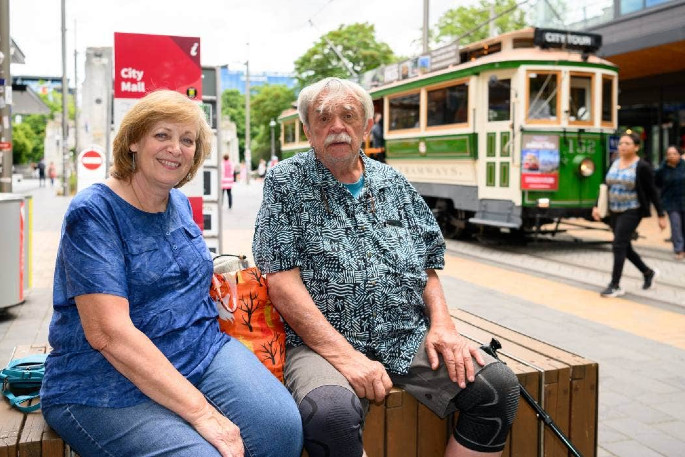
Cruise ship tourists from Las Vegas pose with shopping bags in the Christchurch CBD. NZ Cruise Association chief executive Kevin O'Sullivan says spending by passengers and cruise lines may reach $450m this season, well down on $547m in 2020. Photo: Kai Schwoerer/Stuff.
More recently, on December 5, the departing Majestic Princess reported 307 cases, which represented just under 7 per cent of its 4470 passengers and crew.
Covid-19 Modelling Aotearoa lead researcher Dr Emily Harvey says in late November and early December infection rates in the wider community were more like 2 per cent, much lower than on the Majestic Princess where the actual prevalence was likely even higher than 7 per cent because rapid antigen tests (RATs) don't detect all cases.
What cruise companies are doing
Just before Christmas Harvey says estimated prevalence in the community peaked at around 4 per cent to 5 per cent, and it looks like cruise ships have a lot in common with super-spreading events like multi-day conferences where big groups gather indoors, eating and drinking together.
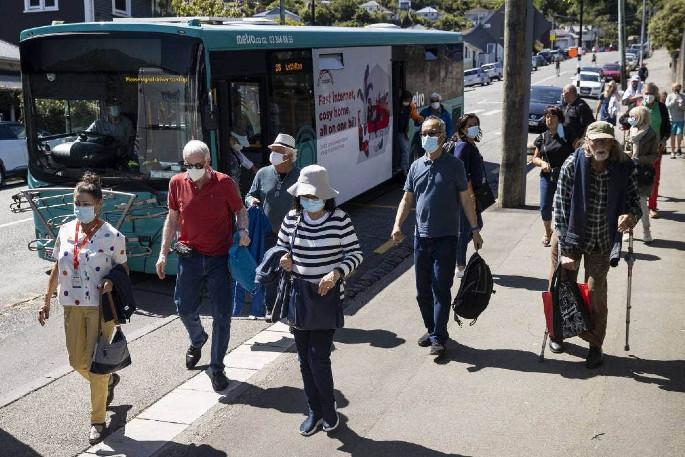
Cruise ship passengers exit a public bus service in the port of Lyttelton where some regular commuters have expressed concerns about sharing transport with so many cruise-goers. Photo: Alden Williams/Stuff.
About 40 per cent of cruises calling at New Zealand ports are part of the Carnival group, including the Princess vessels, and when infections began to climb last month, it reinstated mask-wearing in public spaces where it is difficult to maintain social distancing, and on buses for shore excursions.
In a written response to questions from Stuff, Carnival Australia said 95 per cent of passengers and all crew were vaccinated, and must return a negative test PCR or RAT test before boarding.
Covid-19 sufferers have to isolate for seven days, and antiviral medication is provided free of charge to at-risk passengers.
Close contacts have to test daily before leaving their cabins, wear a mask, and dine and drink in separate areas to other guests.
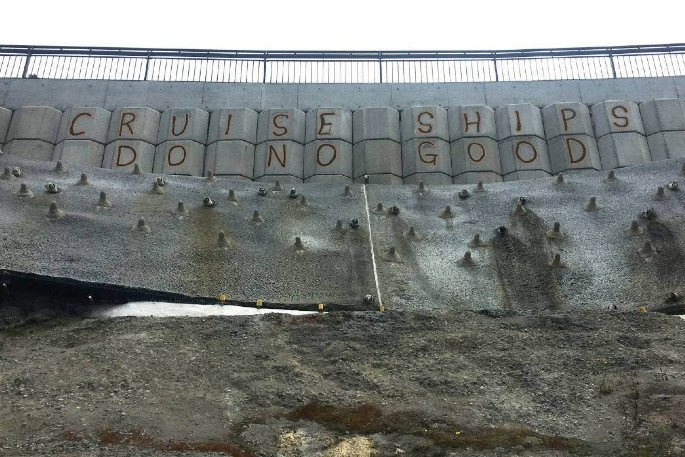
Anti cruise ship graffiti in Lyttelton which regularly hosts swarms of cruise ship passengers.Photo: Supplied.
Port residents flee passenger swarms
Long-time Lyttelton resident Sarah van der Burch says when cruise ships initially returned to the port, very few passengers wore masks, but that had improved recently.
She says most locals try to avoid the town centre when passengers disembark in their hundreds, and there were concerns about Covid transmission, as well as wider impacts on the town.
'Once they come in, we go home or go around the fringes where people typically don't go.”
Christchurch City councillor Sara Templeton raised the issue of over-crowding on public buses with unmasked cruise passengers taking advantage of cheaper fares, and she has had online contact with people in customer service positions convinced they contracted the virus after interacting with cruise passengers.
Keeping safe on board and on shore
Otago University senior lecturer in travel medicine Dr Jenny Visser says medical literature has shown that Northern Hemisphere cruise passengers have in the past 'seeded” Southern Hemisphere communities with measles and out-of-season influenza brought with them, and Covid-19 is no different.
She says the threat of spending a good chunk of your holiday confined to a cabin is a big disincentive to test, and there is no way of knowing how many passengers have concealed their ill health to avoid seven days' isolation.
'I know mask-wearing has dropped out of favour in lots of cafes now, but if I was working in a cafe restaurant or shop where there were lots of travellers from cruise ships, then I'd probably put on a mask, and certainly if I was a bus driver driving them around.
'There's a bit of Covid-washing going on here.
'They [cruise lines] are saying ‘all we need to do is ask people to be vaccinated, tell them to mask up, test them before they come on board, and it's not going to be a problem'. Well that's not true.”
Visser will be the resident doctor aboard the NIWA research ship Tangaroa for a six-week voyage to Antarctica in mid-January, and it's her job to try and keep the 42 people aboard healthy.
That rules out taking anyone who is symptomatic, or classed as a close contact, and nobody boards the ship until they have returned a negative PCR or LAMP test, both regarded as more accurate than RATs.
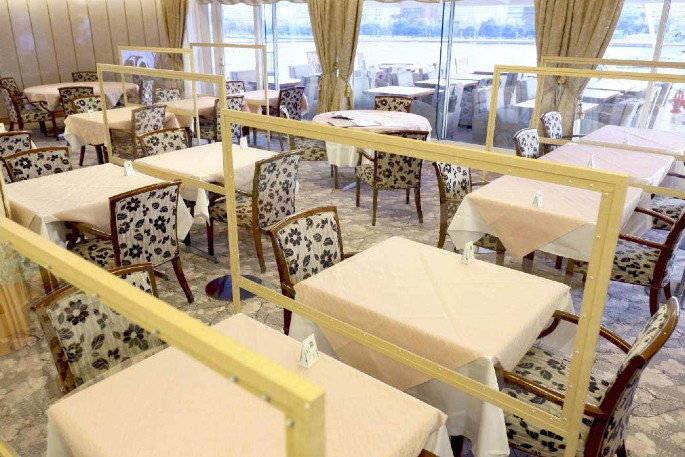
Partitions stand between tables in a restaurant on a Japanese cruise vessel, the Nippon Maru. Covid-19 modeller Dr Emily Harvey says good ventilation is vital in cruise restaurants and bars where passengers are unmasked, because areas where people talk more loudly are associated with higher rates of transmission. Photo: Japan News-Yomiuri/Japan News-Yomiuri.
Mask wearing in public areas will be compulsory, but could be dropped a couple of weeks into the trip if no cases of Covid-19 pop up.
Visser says anyone contemplating taking a cruise needs to weigh up the potential health impact, especially very vulnerable older people.
'A cruise ship is a high-risk situation, you can't get away from that.
'It's not just a question of what are my risks of getting Covid, but what are my chances of getting severe Covid, and is a cruise at this point in time worth the risk?”
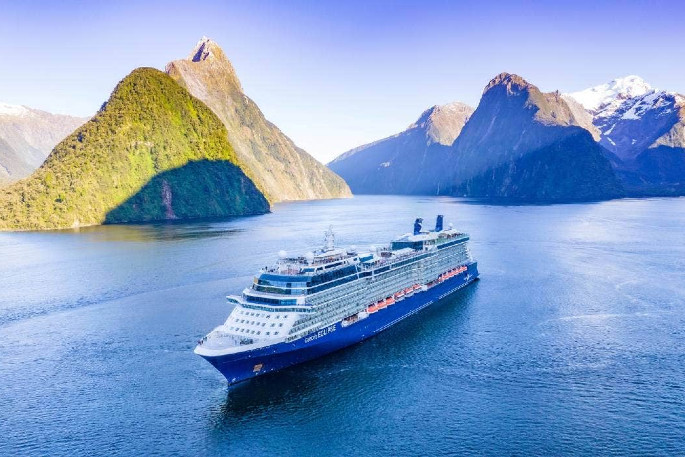
Celebrity Eclipse in Piopiotahi/Milford Sound where there has been talk of banning cruise vessels from the inner sound to preserve the environment. Photo: Celebrity Cruises.
The fact that 5 per cent of people on some cruise ships are unvaccinated worries Visser because she says herd immunity does not work with Covid-19.
'The idea that if you have enough people vaccinated, it doesn't matter if there's a certain percentage unvaccinated.
'With measles, that's around the 95 per cent mark, but for Covid it needs to be close to 100 per cent.
'There's no evidence that vaccinating 95 per cent of the population is enough to keep the unvaccinated safe, I'd feel really nervous.”

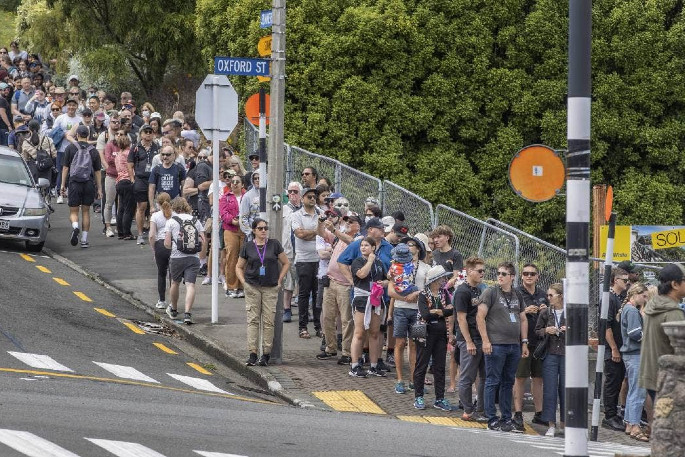

6 comments
money is all that matters
Posted on 01-01-2023 15:49 | By This Guy
Only thing that matters is money, businesses have to keep making money even if a few hundred people have to die for it (80 people in the last week) but hey as long as the hospitality sector is making record profits its all worth it aye? /sarcasm (also doing the barest minimum (like wearing a mask) is just TOO MUCH EFFORT for most people it would seem)
Living with it
Posted on 01-01-2023 15:58 | By Kancho
After all the delayed vaccination delayed self testing and over long national shutdowns now no one seems to care. Hence the number of cases surge to record breaking numbers and now 2333 deaths and climbing near four hundred and fifty in hospital and also climbing. Also vaccines are starting to reach the end of effectiveness after ten months from vaccination so where are the new vaccines that have been developed for new strains especially the more vulnerable? The government is very very quiet again. However we seem to take the risks of tourism for the money so that's ok . Surely though people worrying about the influx should protect themselves and wear masks , wash hands etc on transport and in shops etc. I see little evidence yet
Cruise ship
Posted on 01-01-2023 20:11 | By Womby
I was recently on a cruise ship, we had to be fully vaccinated and boosters done too And a PCR or a RAT test had to have been done before boarding I never heard or saw any coughing or heard of any Covid-19 cases, masks were worn around the food but obviously not when eating But I continue to listen to uninformed people who haven’t been cruising saying that they would never get on one of those sickness boats! Yet at all the events, pubs, supermarkets etc people are maskless, and it seems many nz Covid-19 sufferers don’t test and continue to go to work etc No wonder the numbers are up
Welcome back
Posted on 01-01-2023 21:00 | By Local Too
Great to see the cruise ships back, who wants to live life like the last two years, not me.
@Womby
Posted on 02-01-2023 08:54 | By The Professor
Well said Womby.
It's no good wailing about it.
Posted on 02-01-2023 12:16 | By morepork
The simple fact is that after two years of controversy, dodgy information, and restrictions, people have simply had enough. I have a friend who just embarked on a cruise recently (she goes regularly) and she hasn't even given Covid a thought, apart from the mandatory requirements laid down by the cruise line. While I understand her position, I wouldn't go myself. I carry a K95 mask in my pocket these days and, if I find myself in a place that is crowded, I put it on. We need to learn to live sensibly with Covid, minimize risk where possible, and observe isolation and treatment if we are "unlucky". Money IS a big motivator that encourages sellers to talk down the risks and present information that may not be reliable. But, we need to keep the Economy rolling and so it comes down to personal assessment and responsibility.
Leave a Comment
You must be logged in to make a comment.